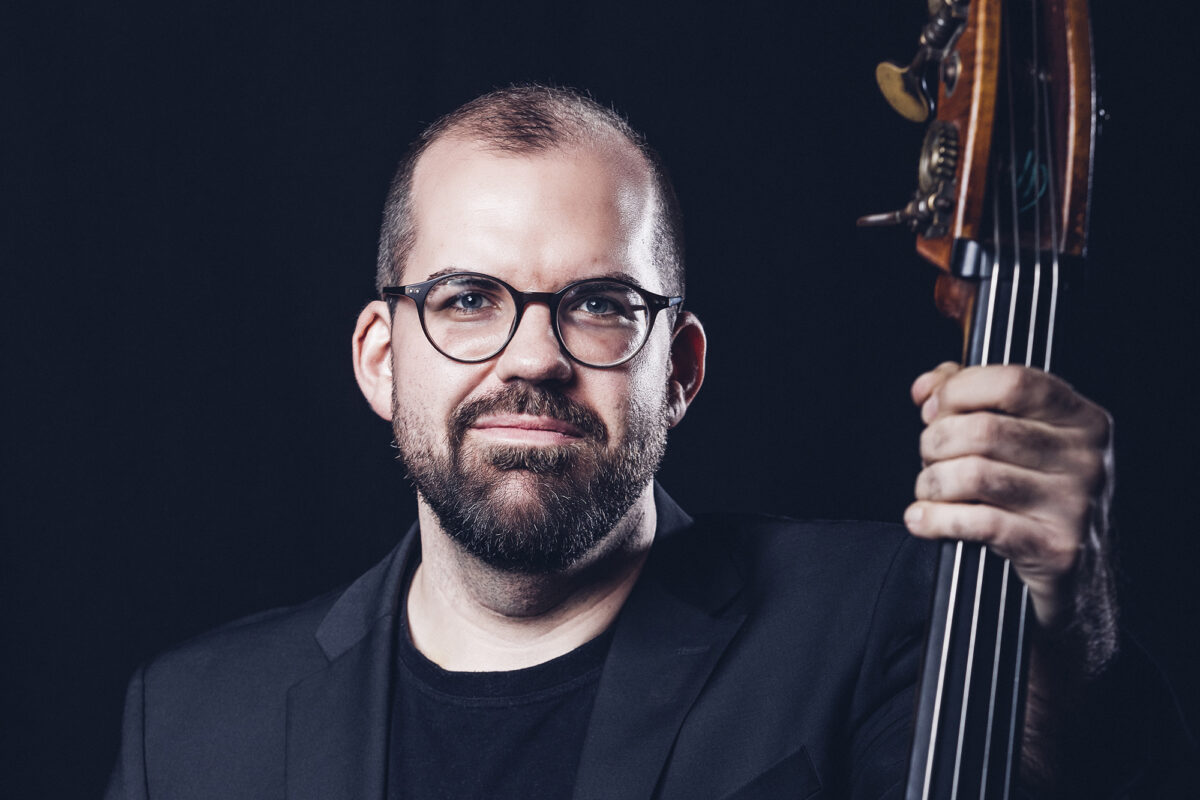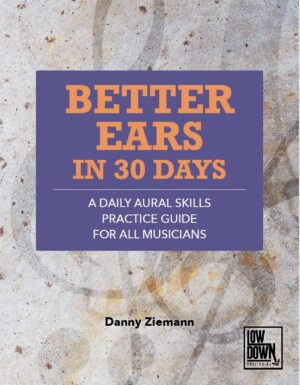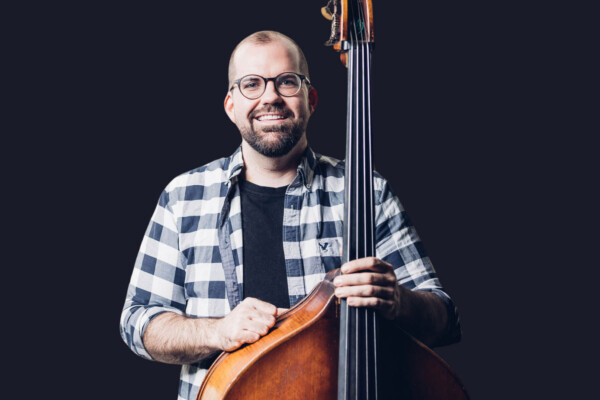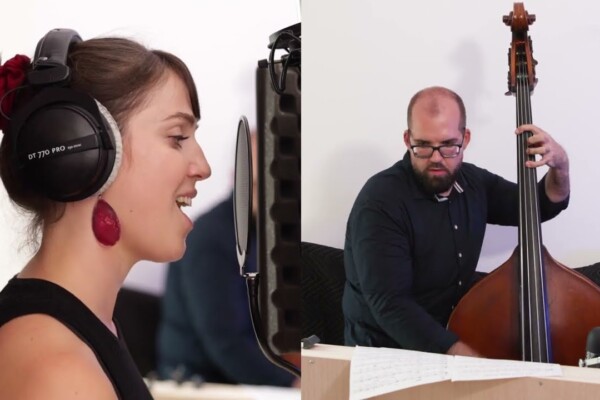Getting Better Ears: An Interview with Danny Ziemann

Music is a language, and if you want to be a good communicator, you must be a good listener. We need “big ears” to understand harmonic movement, melodic motifs, dynamics, and everything that’s happening around us. Renowned bassist and educator Danny Ziemann has just released a new book called Better Ears in 30 Days to make you a better listener and a better musician.
 “Here’s the truth: having a superior ear is what sets apart the best from the rest and gets you the big gig,” Ziemann states. “With 30 days of practice plans, supplemental audio, and an emphasis on developing practical skills, you’ll learn to transform your ears into your top competitive advantage.”
“Here’s the truth: having a superior ear is what sets apart the best from the rest and gets you the big gig,” Ziemann states. “With 30 days of practice plans, supplemental audio, and an emphasis on developing practical skills, you’ll learn to transform your ears into your top competitive advantage.”
Ziemann, who has also published four books on jazz bass, clearly has the skills he teaches. He’s performed with Delfeayo Marsalis, Don Menza, Michael Dease, Peter Erskine, and many more. His most recent release is a jaw-dropping duo album with vocalist Valerie Costa called And That Would Be…. Their interplay is incredible, and Ziemann created dazzling bass lines to fill out the arrangements.
We caught up with Ziemann to learn about his background, how to get better ears, and how to be a better teacher.
How did you get your musical start and who were your early influences?
From when I was around five years old, I relentlessly asked my parents for a guitar… until I got one around the age of nine. At the same time, I started studying violin in school until my middle school teacher asked me to switch to bass a year later. (She told me, “we need smart people to play the bass,” and I was flattered!). I connected with a local jazz bassist, Wayne Moose, and studied with him until I went off to college at the Eastman School of Music.
My early influences are a funny mix: on the guitar, it was heavy metal heroes like Marty Friedman and Steve Vai. On bass, it was Ray Brown and Christian McBride. Talk about two opposite ends of the spectrum! I really fell in love with Ray Brown’s sound, and around age 12, I was already trying to learn his walking lines from recordings and copy his sound. I still love metal guitar, but I think I ultimately would have had better luck career-wise as a jazz bassist!
(Rumor has it there are still bootleg CDs of my first band when I was 12 years old… with me shredding my head off!)
What music have you been digging into lately?
Lately I’ve been digging more into singer-songwriters … in particular Rebecca Martin, James Taylor, and Lizzy McAlpine. I love the power of the song — melody, lyric, and harmony — and the simple arrangements that can really serve the music. I think these three musicians exemplify the craft of songwriting. It really goes to show you that a great song can stand on its own and doesn’t need much to bring it to life.
Your recent album, And That Would Be…, has some gorgeous arrangements of standards for bass and voice. How did you pick those tunes, and what was your process like for them?
Thank you! When Valerie Costa and I started rehearsing for the album, we first picked some of the tunes we knew in common and played them “jam-session style,” meaning there was no specific arrangement. As we played more, we started to get a feel for what tunes had a good vibe and also kept note of what intuitive decisions were made that we wanted to explore further as arrangement options.
A lot of that was on me to try and support her in a way that went beyond what I would traditionally do in a trio or quartet. I tried to think like a pianist — changing textures, ranges, and different harmonic options — and improvise as if I was playing a pre-constructed, written part. Valerie was really game to try anything, and her great listening skills made it possible for me to really explore new sounds and stretch out.
As a highly renowned educator, what makes a good teacher to you?
I’ll say that I’ve been very fortunate to have some incredible teachers in my life who exemplify excellence in teaching and learning. In a sense, I’m trying to uphold the quality of teaching and values they represented in their work. To me, they embodied selflessness (always trying to serve the student), vulnerability (always being willing to make mistakes and put themselves on the spot), and they made learning music fun.
I believe a good teacher is someone who serves the needs of the student first and foremost, has a realistic expectation about what they can and will achieve (meaning we are not placing our own desires above theirs), is patient, creative in finding solutions (rather than just applying a one-size-fits-all approach), and helps the student love music more than when they started lessons.
Somewhere along the way, we often forget that music learning can be fun… and many of us go into a phase where growth feels like a grind. I’m not a fan of the old-school teaching approach; never was, and I think it serves no place in modern teaching. Those experiences can be traumatic and last a lifetime. Things that are worth learning are often difficult, but that doesn’t mean we need to develop a negative relationship with studying or become self-deprecating in the process.
A great teacher can help a student get ahead of those feelings and have a healthy relationship with their art.
What is one of the best lessons you ever received?
I can think of two specific experiences: one with Jeff Campbell (Professor of Jazz Bass at the Eastman School of Music) and jazz bass legend Larry Grenadier.
Jeff Campbell was my teacher in college — and truly one of the best teachers I have ever had the pleasure of working with. In one of our first lessons, he told me, “I want to be as useless to you as quickly as possible.” Jeff is a master at giving students the skills to develop their musicianship independently. I had never experienced that so directly with a teacher before, and he absolutely gave me the tools to discover and fine-tune my relationship with the instrument for life. I credit Jeff with so much, particularly with expanding my understanding of sound and the fingerboard. If you’re reading this: THANK YOU, Jeff!
The other experience is my first lesson with Larry Grenadier. I studied on and off with Larry for years, and he is one of my greatest mentors. The first time I played for him, he asked me to do something “simple”: play a 12-bar blues with only chord tones. I got about three bars in before I fell flat on my face. In that moment, I understood what it meant to really have control over the fundamentals. Bassists often spend time trying to sound hip and play complex ideas but without the ability to play something extremely simple in a convincing, supportive fashion. I worked on that exercise for six months with different tunes, and my playing changed forever. In subsequent years we got deeper into the nuances of sound, interaction, and clarity — something that was only possible because of his encouragement to really focus on mastering the fundamentals.
What advice do you have for bassists wanting to become better teachers?
Becoming a great teacher is about your mindset, and a lot has to do with natural intuition and human connection. Remember that you’re teaching people, not “just” bassists or musicians. While it’s easy to focus the lesson or outcomes just on what we can do — e.g., technique, exercises, playing songs, etc. — sometimes the biggest advancements come from fostering a very human connection with the people who study with us and making sure the student feels heard and understood.
One practical thing is to video record your lessons and review them after. Were there things you missed or glossed over in the lesson? This is a very confronting and vulnerable process, but one that can quickly lead to effective changes in your teaching.
Otherwise, think about something unique you bring to the table. Of all the teachers in the world, why did the student come to study with you? Was it only to learn about technique? (Probably not).
Whenever I start working with a new student, I think about the following two things: 1) What will they understand and be able to do/demonstrate after our lessons are finished?, and 2) What’s something that they might ONLY learn from me and my experience/perspective? So many early-career teachers focus primarily on technique and miss other teaching opportunities.
In a musician’s studying life — assuming they take lessons from other teachers — I know that there will always be enough talk about technique and theory. ALWAYS! Adopting a mindset around your unique experience helps create lessons that are more personalized without this feeling of “Oh shoot, I need to give them more exercises and ____.” That’s why I focus much of my energy on listening and creating activities that develop the ear, for example.
How do you define “good ears”?
Good ears are ears that are reliable and relatable. Reliable in the sense that you can trust they are giving you an accurate assessment of what’s going on, and relatable in the sense that you can intuitively take action on what you’re hearing. This is true regardless of genre or instrument.
Of course, in the context of listening, there are a lot of things we can pay attention to harmony, melody, rhythm, form, dynamics, tonal colors, interaction, etc. Having an awareness of all of these details will make for a more empathetic performance. However, I often find that while most musicians have a keen sense of melody and aesthetic details, they often lack fundamental harmonic listening skills.
That’s why in Better Ears in 30 Days, I focus on harmonic (chord progression) listening as the foundation for the book. When this skill is strong, I believe it can give musicians extreme confidence to play with more understanding, without sheet music, and without the fear of getting lost.
How would you differentiate someone that plays by ear to someone with good ears? How does one bridge that gap?
This is a great question! There’s definitely a lot of crossover. To me, someone who “plays by ear” has the connotation of being self-taught or not having received much “formal” musical education. Someone with “good ears” could be in that situation or might have had more formal educational experiences.
Let me be clear in saying that a formal education is not a prerequisite for having good ears. Absolutely ANYONE can develop great listening skills regardless of their experiences. And in either situation, both probably have reliable ears — with the only difference being in how they relate to, understand, or categorize what they hear.
The thing I would encourage anyone who wants better ears — self-taught or not — is to follow a system and find concrete ways to relate to and differentiate what you’re hearing. It’s great if you can hear something, but not as helpful if you can’t understand it or take action on your instrument!
What takeaways will bassists who use Better Ears walk away with?
The immediate takeaway is a better understanding of what the musicians around you are playing and more confidence on the bandstand. Whether you’re in a classical context, rock, jazz, or something in between, every bassist can benefit from knowing exactly what’s happening around them. In my career, one of the primary reasons I get hired is because of my ears — and the fact that musicians can trust I’ll be able to follow and support them every step of the way. It’s the one skill that has allowed my career to advance to higher levels than I imagined possible.
The tools in the book will help bassists learn tunes much faster, transcribe much faster, and be able to think much less on the bandstand.
What would be the next step after the 30 days?
Keep going and trying things on your own! After 30 days, I hope readers will have the feeling of “Hey, I can actually do this!”
Otherwise, there are a few things people can do. One is to continue learning new tunes in the same fashion I teach them in the book. I present a consistent system and method for learning tunes, and it’s one that the reader can continue to adopt after the book is finished. (Think of the Jeff Campbell quote, “I want to be as useless to you as quickly as possible”!) Otherwise, readers can continue singing with solfège, finding different recordings to learn from, and above all: be fearless in learning!
For those who are looking for more mentorship and guidance, I run a group program called the First Call Musician. It’s not right for everyone, but some really benefit from the accountability and focused environment where they can tackle these skills.
What is your next project shaping up to be?
I’ve got a lot of projects cooking right now! I’ll be making a live trio record in June with pianist Danny Grissett and drummer Jorge Rossy, which I’m very excited about. Danny is an incredible pianist, and Jorge is one of my musical heroes. (We recorded another album in the past with Jorge playing vibes). I’ll also be launching my First Call Musician group program in June, designed to help musicians transform their listening skills and work with the top musicians around.
Otherwise, I just started a recording studio in Vienna (Tusita Studios) and will be focusing on recording jazz and acoustic music. I used to work in a studio when I was younger, and I’ve been in and out of studios for the last 18 years… so I can’t wait to dive into this new venture. And lastly, Valerie and I have been writing an album of all-original music which is exciting and new for both of us. Of course, we’ll be recording it in the new studio!



